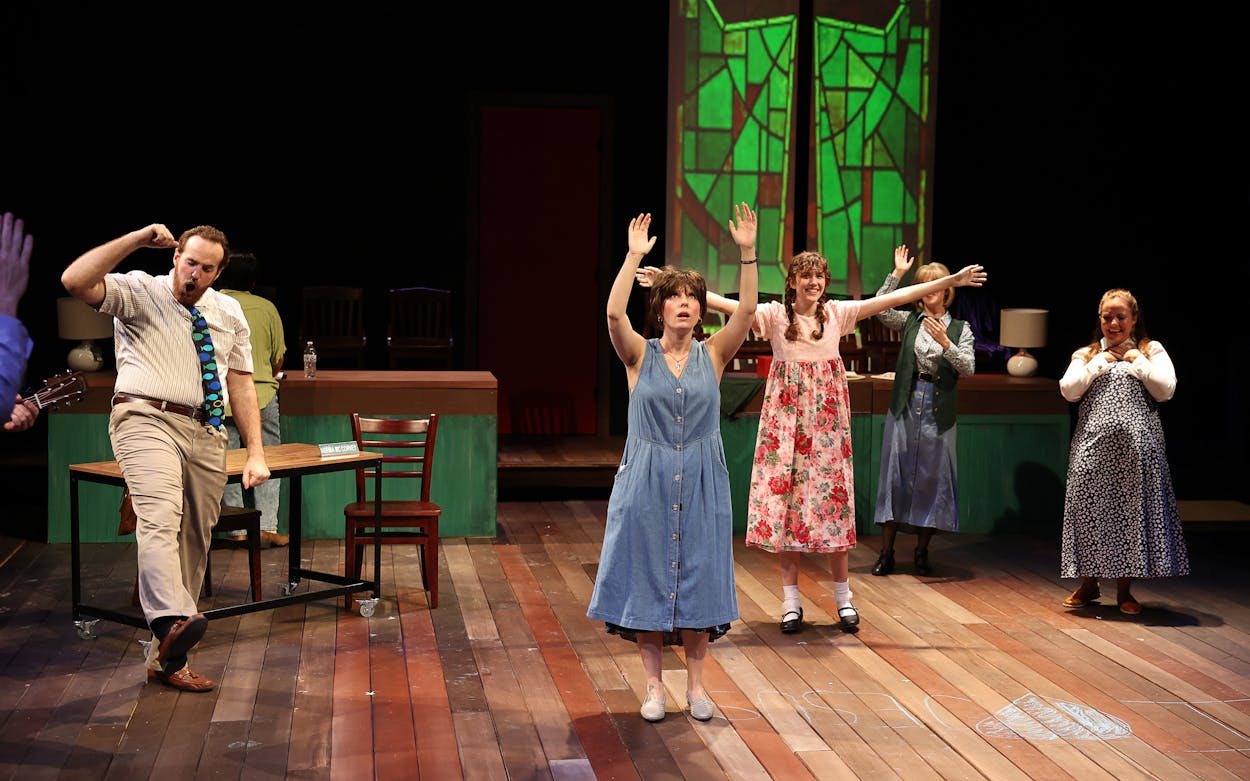A poignant prologue and epilogue bookend the new iteration of ROE, the perennially timely play about the landmark 1973 Supreme Court decision known as Roe v. Wade, running at Stages in Houston through March 5. As Sarah Weddington (the lawyer who represented “Jane Roe”), actor Kelley Peters delivers fervent monologues that contextualize Roe for our current, urgent times. The additions, written over the past few months to confront the Dobbs v. Jackson decision that rolled back reproductive rights, capture the challenging reality of our post-Roe society. As we listened to Peters recite the sobering state of reproductive rights today, Texan theatergoers fell still and silent.
“This is a Texas story,” said playwright Lisa Loomer. “It began in Texas, and most of the play, maybe all of the play, takes place in Texas. [There’s also] the fact that the most draconian measures now are taking place in Texas. I mean, I couldn’t make that up.” The weighty timeliness of the show is not lost on Stages’ managing director Katie Maltais, who thinks Houston is the ultimate Texas venue for ROE. “Houston is an environment where there are so many different communities that make up a broader spectrum,” Maltais said. “It is the perfect place to debut a play that is so complicated.”
The crowd—full of a diverse group of Houstonians the night I visited—is engulfed in dueling oral histories between the two protagonists, Norma McCorvey (the plaintiff known as “Roe,” played by Teresa Zimmermann) and Sarah Weddington (the lawyer), political beliefs about abortion be damned. Watching ROE, every theatergoer’s beliefs are challenged. That’s by design.
“The two protagonists remember the story quite differently,” said Loomer. “This theatrical frame of both of them telling the story and fighting for the story is a metaphor for that divide.” There’s no singular bad guy here; Loomer imbues all her characters with empathy, made even more intimate by the theater’s thrust stage that extends into the audience. “I really see the play as an invitation and a call to action to listen to both sides of the issue,” said ROE director Kim McKean.
This noticeable (and welcomed) lack of finger-pointing was embedded in the show’s DNA from the moment of its creative conception. “I wanted to know why this is the one subject that Americans cannot even talk to each other about, even if they’re in the same family,” said Loomer. “I was interested in that divide. And in order to depict that divide, I had to delve very deeply into the points of view of both sides. And as I did that, I thought, ‘If I’m going to put something on stage, I don’t want an easy villain.’ I want three-dimensional people. I want to understand.”
Loomer began conducting research for ROE in Austin around 2014, and the play was first performed in Oregon in 2016. As legislation whittled away at the 1973 Supreme Court ruling, Loomer reflected those legal and cultural changes in the play. “I’ve rewritten this five times, because every time it’s been presented, it has sat in a different position and a different perspective of history. So it’s like a living-history play,” she said.
Those complications are on display during one of Norma and Sarah’s many arguments about the fluid facts in their respective books. While the play revolves around the two women’s historical accounts, we also meet tangential characters based on their real-life significant others (Briana J. Resa is exceptional as Connie Gonzalez, Norma McCorvey’s partner), coworkers, and influences. We also hear from other women who grapple with the history of reproductive research in this country. Uma, one of the five characters played by Troi Coleman, reminds Norma and Sarah about the sterilization, forced hysterectomies, and long-term birth control experimentation on Black, Mexican, and Indigenous women. Staring directly into the audience, she asks, “Where’s that in their books?” This moment took my breath away, and I heard the distinct sound of a creaking chair as someone shifted in discomfort. Mercifully, these arresting moments are balanced with humor. “Humor is very disarming,” said Loomer. “If you can disarm people with humor and also treat both sides with compassion, you have a way better chance of getting to people’s hearts.”
ROE was challenging to watch, and it is clearly a play for people who believe in reproductive rights, or at least have compassion and empathy for those who do. “I hope people will come because they’re furious, and passionate,” said Loomer. “But I hope that both sides will sit in that audience and strike up a conversation the next day. Because the most dangerous thing is if we stop talking to each other.”






